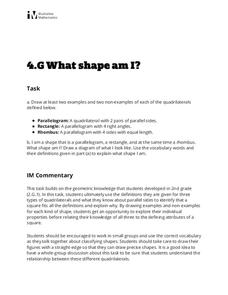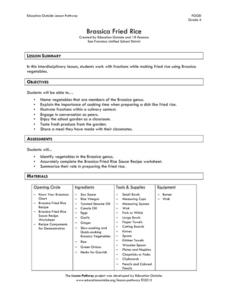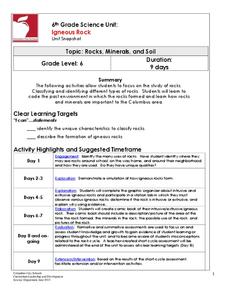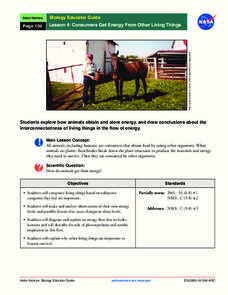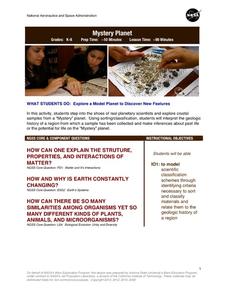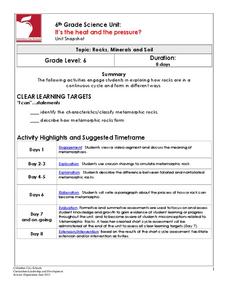Virginia Department of Education
World History and Geography to 1500 A.D.
Here's a great resource for your curriculum library. The 240-page packet, organized into units by topics, includes sample lesson plans, links to primary and secondary source documents, worksheets, activities, and sample assessments.
Michigan State University
Bug Lyphe!
Introduce ecology classes to biodiversity and interdependence in ecosystems with a PowerPoint presentation. Then, they get up-close and personal with the invertebrate world by collecting insects, classifying them, and graphing their...
Virginia Department of Education
Elements and Electron Configuration
It's electronic! Pupils uncover elements and their electron configurations as they explore mass, groupings, correct charges, and sliding theory. Young scientists learn creative ways to remember various elements and correctly...
Curated OER
Rocks and Minerals
Take young geologists on an exploration of the collection of rocks and minerals that we call Earth with an upper-elementary science lesson. Through a series of class discussion and hands-on investigations, students learn about the...
Illustrative Mathematics
What Shape Am I?
Sharpen your pencil and grab a ruler, it's time to draw some quadrilaterals! Given the definition of a parallelogram, rectangle, and rhombus, learners draw examples and nonexamples of each figure. The three definitions are...
Mr. Jones's Science Class
Periodic Table Project
Don't be fooled by the title; this is not really a lesson on elements. It is a project on classification, using the periodic table as an example. For that reason, it could be used in any branch of science. As an example, a group may...
Columbus City Schools
Biome Basics with a Disastrous Twist
Bored with your current biome bag of tricks? This bundle is a bountiful bag of biome fun! Travel the globe with seventh graders and explore the biotic and abiotic factors that define our world's biomes. Then, introduce a little...
Illinois Department of Natural Resources
Section One: What is Biodiversity?
Four intriguing and scientific activities invite learners to explore the natural resources of their town. The activities cover concepts such as genetic traits, organizing species in a taxonomy, the differences between different species...
American Chemical Society
Color Changes with Acids and Bases
Getting back to the beginning of the unit, learners use reactions with red cabbage juice to determine if solutions are acidic, neutral, or basic. This is a straightforward and classic investigation, but what you will appreciate is the...
Education Outside
Brassica Fried Rice
Here's a delicious way to engage fourth graders into working with fractions. Kids chop brassica or cruciferous vegetables, measure the required ingredients, and add them to cooked rice to produce a delicious treat.
Council for the Curriculum, Examinations and Assessment
Morals, Values and Beliefs
Your personality is based on the things you believe in, the morals you abide by, and the values upon which you make your decisions. Delve into a set of lessons about values and moral framework with your eighth graders as...
University of Delaware
Constructing Text-Based Arguments About Social Issues
Eighth graders take a stand on a variety of controversial topics with a lesson on argumentative writing. As they view an informative presentation and work with collaborative groups, they decide which side of each argument they want to...
Columbus City Schools
Igneous Rock
These rocks are HOT! Well, they used to be, anyway. Take young geologists on a two-week journey through the life and times of the average igneous rock. Lab groups work together to hypothesize about intrusive and extrusive igneous...
NASA
Consumers Get Energy From Other Living Things
How do plants and animals get their food? Learn about where energy comes from, how animals store energy, and aerobic respiration, in a lesson that allows scholars to diagram energy flows.
Hawaiʻi State Department of Education
Machines
What do science and dance have in common? Simple machines, work, and force! First, children discuss machines, wheels, inclined planes, and wedges. They create inclined planes with their bodies and make up dances about wheels and wedges....
Alliance Theater
The Jungle Book Post-Show STEAM Lesson
An ecosystem is really just the flow of energy through many different living organisms. A study of Rudyard Kipling's The Jungle Book leads to an environmental science activity in which learners study how various factors can affect...
Columbus City Schools
Sedimentary Rocks
Turn your class discussion of rock formation from ho-hum to holy hornfels! Junior geologists gain experience in identifying rock types and rock origins, with an emphasis in hypothesizing the environment needed to form certain...
UAF Geophysical Institute
Carbon Footprint
Your young environmentalists can calculate their carbon footprint and discuss ways to reduce it with a worksheet about climate change. After reading a handout about what impact one's carbon footprint can have on the environment, kids...
National Park Service
Living & Non-Living Interactions
What better way to learn about ecosystems than by getting outside and observing them first hand? Accompanying a field trip to a local park or outdoor space, this series of collaborative activities engages children in...
Rainforest Alliance
Colombia Biodiversity
How diverse is the rainforest? How much more diverse is a rain forest than a temperate forest? Explore these focus questions in a lesson that explores the plants, animals, and insects in forests. After listening to a reading...
Google
Intermediate 4: Searching for Evidence for Research Tasks
Online resources take many forms: blogs, search engines, news websites, documents, wikis. In order to conduct effective research, pupils should become familiar with different formats so that they can more easily choose suitable sites for...
NASA
Mystery Planet
What can one learn about a planet based on a small surface sample? Learners will explore artifacts from a mystery planet and see what they can determine about the planet based on the evidence in front of them.
Tech Museum of Innovation
Seed Dispersal
Engineering challenges are not just man-made ... nature has its own set of them. A hands-on STEM activity has groups designing a seed dispersal system. Each group can only use one sheet of paper — a tough task!
Columbus City Schools
It's the Heat and the Pressure?
Ready for a change? Give a comprehensive collection of metamorphic materials a try! With the assortment of printables and lab activities, you won't be under pressure to keep things lively. The unit culminates by having...




